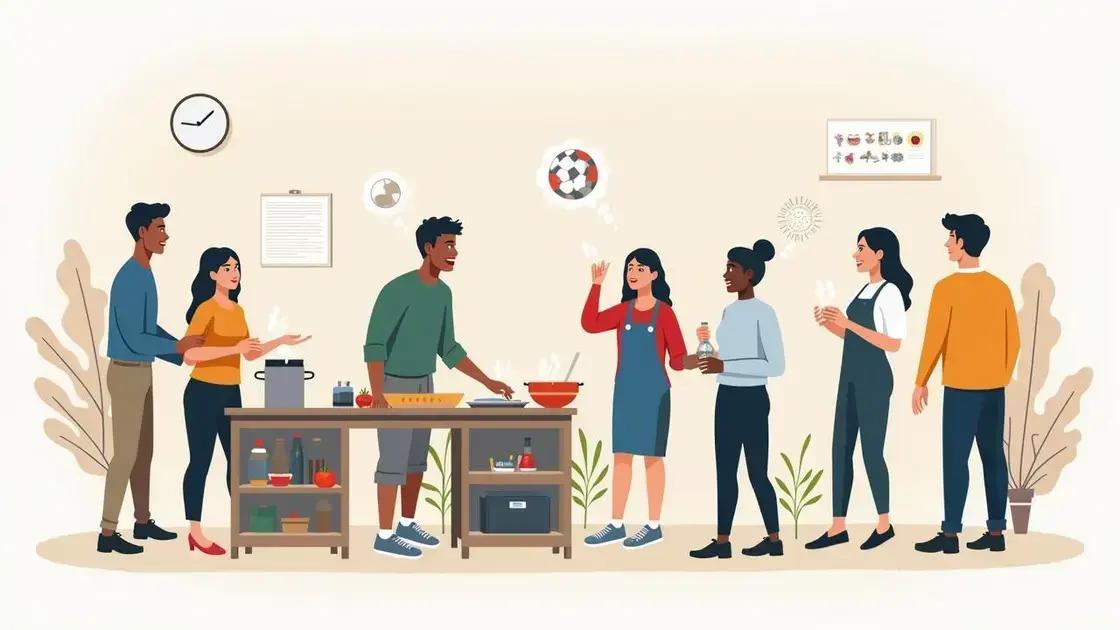The importance of social connections for mental and physical health cannot be overstated; strong relationships provide emotional support, reduce loneliness, and enhance overall well-being, while community involvement fosters belonging and encourages healthy behaviors.
Social connections play a vital role in our mental and physical health, significantly impacting our overall well-being. Studies have shown that individuals with strong social ties tend to experience lower stress levels and improved health outcomes. In this article, we will delve into the importance of social connections, their impact on mental health, and offer practical tips for building and maintaining these essential relationships.
Understanding Mental and Physical Health

Understanding mental and physical health is vital for leading a fulfilled life. Mental health refers to our emotional, psychological, and social well-being. It affects how we think, feel, and act in daily situations. It also influences how we handle stress, relate to others, and make choices. On the other hand, physical health refers to the body’s overall condition, including the absence of illness and the functioning of bodily systems.
The Connection Between Mental and Physical Health
There is a strong connection between mental and physical health. When either one is compromised, the other tends to suffer as well. For example, chronic stress can lead to physical symptoms like headaches and fatigue. Conversely, poor physical health can contribute to feelings of depression and anxiety. Recognizing this link can help individuals better manage their overall health.
Factors Affecting Mental and Physical Health
Many factors can influence mental and physical health. These include genetics, life experiences, and lifestyle choices. Exercise, nutrition, and social interactions play a significant role in maintaining both aspects of health. Engaging in regular physical activity can lift one’s mood and reduce feelings of anxiety. A balanced diet fuels the body and brain, contributing to emotional well-being.
The Role of Stress
Stress can affect both mental and physical health significantly. When a person experiences stress, the body releases hormones that can lead to various health issues. Chronic stress may increase the risk of heart disease, obesity, and depression. Learning to manage stress through relaxation techniques can help maintain both functions of health.
How Social Connections Enhance Well-Being

Social connections greatly enhance our overall well-being by providing emotional support, improving our mental health, and promoting a sense of belonging. When we interact with others, our brains release oxytocin, a hormone that fosters feelings of happiness and reduces stress. This chemical reaction strengthens our emotional bonds and contributes positively to mental health.
Emotional Support
Having a network of friends and family gives us a healthy outlet for our feelings. Sharing our thoughts with others can lighten heavy burdens and provide a fresh perspective. Whether facing personal challenges or celebrating achievements, friends and family play a crucial role in our lives. This emotional support helps us navigate through tough times and encourages us during struggles.
Improving Mental Health
Regular social interactions can combat feelings of loneliness and isolation, common triggers for mental health issues like anxiety and depression. Engaging with others creates a sense of community and shared experiences, combatting these negative feelings. Studies reveal that people with strong social networks tend to have better mental health and improved coping strategies.
Sense of Belonging
Being part of a group, whether it be friends, family, or a community, fulfills our innate need for belonging. This sense of community enhances self-esteem and promotes positive self-image. When we feel accepted and valued, we are more likely to take care of ourselves physically and mentally, leading to a healthier lifestyle.
Improved Quality of Life
Overall, social connections contribute to enhancing our quality of life. Those with fulfilling relationships often lead happier lives, experience less stress, and report better health outcomes. Engaging socially, whether through hobbies, community service, or simple gatherings, allows individuals to foster meaningful connections that enrich their lives.
The Role of Community in Mental Health

The role of community in mental health is vital for fostering a supportive environment. Communities provide connections that enhance emotional health and reduce feelings of loneliness. When individuals feel they belong to a community, they are more likely to seek help and support during tough times. This sense of belonging can lead to an improvement in overall mental well-being.
Support Systems
Communities act as support systems for individuals facing mental health challenges. Neighbors, social groups, and community organizations can offer assistance and resources. When people are aware of available help, they are more likely to access mental health services, fostering better mental health outcomes.
Awareness and Education
Communities can play a crucial role in promoting awareness and education about mental health. Community events and programs can help to dispel myths and reduce stigma surrounding mental illness. By educating members about mental health issues, communities can encourage open discussions and foster acceptance and understanding.
Creating Safe Spaces
Safe spaces within a community allow individuals to express themselves freely without fear of judgment. Support groups, therapy sessions, and community centers provide environments to share experiences and struggles. These safe spaces are key to mental well-being, as they encourage open communications and foster healing.
Social Engagement
Active community participation promotes social engagement, which is crucial for mental health. Volunteering, attending events, and joining clubs or teams can help reduce feelings of isolation. Engaging with others in meaningful ways creates fulfilling relationships that contribute to enhanced emotional well-being.
Tips for Building Stronger Social Connections

Building stronger social connections is essential for improving mental health. Here are some effective tips to help foster meaningful relationships:
1. Be Open and Approachable
Being open to new relationships starts with your attitude. Smile and make eye contact when interacting with others. Show interest in what they have to say. This creates a friendly atmosphere and encourages conversation.
2. Join Groups or Clubs
Participating in community groups or clubs that match your interests can help you meet like-minded people. Whether it’s sports, arts, or volunteering, these activities provide opportunities to connect with others and find common ground.
3. Reach Out to Others
Don’t wait for others to come to you. Take the initiative to reach out. Send a text, make a phone call, or invite someone for coffee. Making the first move can strengthen your connections.
4. Be a Good Listener
Listening is just as important as sharing. Show that you care by actively listening to what others have to say. Ask open-ended questions and respond thoughtfully. This deepens relationships and makes others feel valued.
5. Spend Quality Time Together
Quality time is essential for strengthening connections. Make plans to do activities you both enjoy. Whether it’s hiking, cooking, or simply having a chat, shared experiences build stronger bonds.
6. Be Supportive
Support your friends and family during tough times. Offer help when they need it, whether emotionally or practically. Being there for someone fosters trust and gratitude in relationships.
7. Stay in Touch
Regularly check in with friends, even if it’s just a quick message. Consistent communication keeps relationships alive and shows that you care. Small gestures can make a big difference.
The Importance of Social Connections in Our Lives
Understanding the role of social connections in mental health is crucial for fostering well-being. Strong relationships provide emotional support, enhance our quality of life, and contribute to both mental and physical health.
Community involvement plays a significant role in promoting mental wellness. By engaging with others, we can dispel stigma around mental health and create safe spaces for sharing experiences and challenges.
Implementing practical tips to strengthen our social connections leads to improved mental health outcomes. Being open, joining groups, and being a good listener can create lasting relationships that enrich our lives.
Overall, social connections are not just beneficial; they are essential for living happier, healthier, and more fulfilled lives.
FAQ – Frequently Asked Questions about the Importance of Social Connections for Mental Health
Why are social connections important for mental health?
Social connections provide emotional support, reduce feelings of loneliness, and help individuals cope with stress, enhancing overall mental well-being.
How can I improve my social connections?
You can improve social connections by being open and approachable, joining clubs or groups, and making an effort to reach out to friends and family.
What role does community play in mental health?
Community involvement fosters a sense of belonging and provides support systems that contribute to better mental health outcomes.
How do I create a supportive environment in my community?
You can create a supportive environment by hosting events, promoting awareness about mental health, and encouraging open conversations about emotional well-being.
What are some activities to strengthen social bonds?
Participating in group activities like volunteering, attending local events, or joining interest-based clubs can strengthen social bonds.
Can building social connections improve my physical health?
Yes, strong social connections can lead to better physical health by encouraging healthy behaviors and reducing stress.













